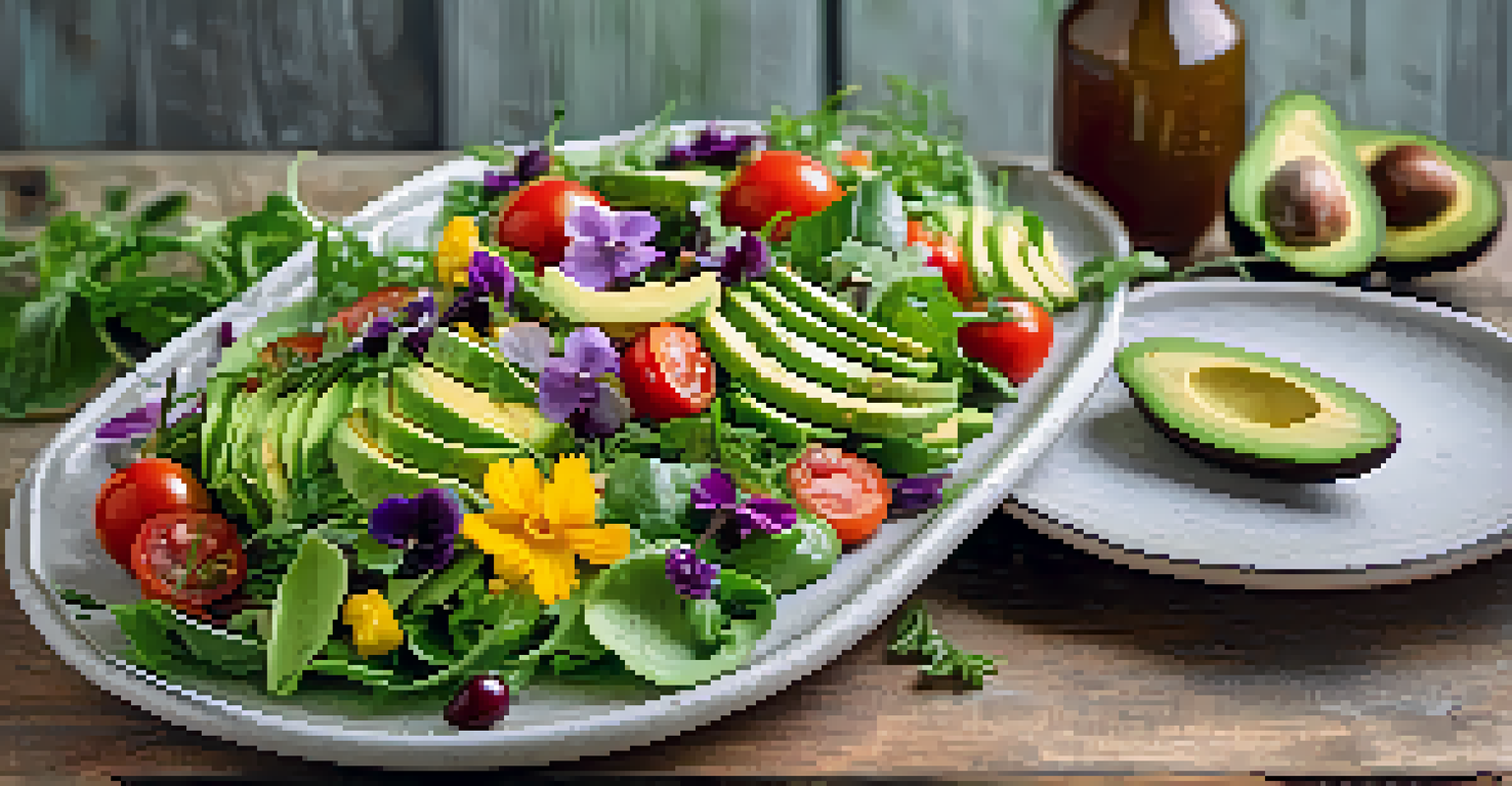Exploring the Benefits of Seasonal Vegan Foods for Health

Understanding Seasonal Vegan Foods and Their Importance
Seasonal vegan foods refer to fruits, vegetables, and grains that are harvested during specific times of the year. Eating these foods not only supports local agriculture but also ensures that you’re consuming produce at its peak freshness and nutritional value. For example, tomatoes in summer are juicier and tastier than those available in winter, which are often hothouse-grown or imported.
Eating seasonally is a way of being in harmony with nature's rhythms.
When you choose seasonal foods, you’re also more likely to eat a diverse diet. This variety helps your body get a wide range of vitamins and minerals, which are crucial for maintaining good health. Picture it like a colorful palette of fruits and veggies—each color represents different nutrients that your body needs.
Additionally, seasonal eating can be more sustainable. When you buy local produce, you reduce the carbon footprint associated with transporting food over long distances. This not only benefits the environment but also stimulates local economies, creating a win-win situation.
Nutritional Advantages of Seasonal Vegan Foods
One of the primary benefits of seasonal vegan foods is their superior nutritional content. Freshly harvested produce tends to have higher levels of vitamins and antioxidants compared to out-of-season foods that have been stored for long periods. For instance, seasonal leafy greens like kale in the fall are packed with nutrients that your body craves during the colder months.

Moreover, seasonal foods often contain more flavor, which can enhance your meals without needing extra salt or unhealthy sauces. Think about biting into a crisp, juicy apple in autumn—its natural sweetness is a delight that processed snacks just can’t compete with. This means healthier, more satisfying meals that keep you full.
Seasonal Foods Enhance Nutrition
Eating seasonal vegan foods provides higher levels of vitamins and antioxidants, which boost your health and immune system.
Eating in season can also encourage you to try new foods that you might not typically include in your diet. When you explore local farmer's markets, you may discover unique fruits and vegetables, expanding your culinary horizons and making healthy eating exciting.
How Seasonal Eating Supports Your Immune System
Seasonal vegan foods can significantly impact your immune system, particularly during times when colds and flu are prevalent. Foods that are in season often align with the nutrients your body needs to fend off illness. For example, citrus fruits in winter are rich in vitamin C, which is known to boost immune function.
The best way to eat is the way nature intended, with fresh, seasonal produce.
Incorporating a variety of seasonal foods helps ensure that you’re getting a range of phytochemicals—naturally occurring compounds that have protective properties. Think of them as your body's little army, ready to fight off potential threats. Eating a colorful salad in the winter made of seasonal veggies can provide an array of these immune-boosting nutrients.
Additionally, seasonal foods often have a shorter time from farm to table, meaning they retain more nutrients and flavor. This freshness translates to a diet that not only tastes better but also keeps your body strong and healthy.
Cost-Effective Benefits of Seasonal Vegan Foods
Another perk of eating seasonal vegan foods is that they are often more affordable. When fruits and vegetables are in season, they are typically more abundant, leading to lower prices at grocery stores and farmers' markets. This means you can fill your cart with fresh produce without breaking the bank.
Moreover, buying seasonal produce encourages meal planning and batch cooking, which can save you money in the long run. For example, if you buy a large quantity of zucchini during the summer, you can freeze some for later use, ensuring that you have access to healthy ingredients even in the off-season.
Cost Savings with Seasonal Eating
Seasonal produce is typically more affordable and encourages meal planning, helping you save money while reducing food waste.
By focusing on what’s in season, you can also reduce food waste. When you buy ingredients that are currently abundant, you're more likely to use them before they spoil. This not only helps your wallet but also contributes to a more sustainable food system.
Culinary Creativity with Seasonal Vegan Ingredients
Seasonal vegan foods can ignite your culinary creativity and inspire you to experiment in the kitchen. Each season brings a unique selection of ingredients ripe for exploration. For instance, summer is the perfect time to whip up refreshing salads, while fall invites heartier dishes with squash and root vegetables.
Trying new recipes based on seasonal ingredients can keep your meals exciting and prevent monotony in your diet. For example, using fresh berries in a summer dessert can create a vibrant and delicious treat that showcases the season's bounty.
Additionally, cooking with seasonal foods can enhance your connection to nature and the environment. It encourages you to be mindful of the cycles of growth and harvest, fostering appreciation for the food that nourishes you.
The Environmental Impact of Seasonal Vegan Eating
Eating seasonal vegan foods is not only beneficial for your health but also for the planet. By choosing locally sourced, seasonal produce, you reduce the demand for out-of-season foods that often require extensive transportation and refrigeration. This helps cut down on greenhouse gas emissions and promotes a more sustainable food system.
Seasonal eating also supports biodiversity. By consuming a variety of fruits and vegetables that are in season, you help maintain agricultural diversity, which is crucial for ecosystem health. Just imagine a world where we only eat a handful of crops—all the flavors and nutrients that would be lost!
Environmental Benefits of Seasonality
Choosing local, seasonal foods supports sustainability by reducing carbon footprints and promoting agricultural biodiversity.
Moreover, supporting local farmers who grow seasonal produce can contribute to sustainable farming practices. These practices often focus on preserving the land and promoting soil health, leading to healthier ecosystems for generations to come.
Tips for Incorporating Seasonal Vegan Foods into Your Diet
Incorporating seasonal vegan foods into your diet doesn’t have to be complicated. Start by visiting your local farmer's market or grocery store and look for produce that is labeled as seasonal or local. This is a simple way to ensure you’re getting the freshest ingredients available.
Meal planning can also help you make the most of seasonal foods. By planning your week’s meals around what’s in season, you can take advantage of lower prices and peak flavors. For example, if squash is in season, consider making a hearty squash soup or a roasted vegetable medley.

Lastly, don’t be afraid to experiment! Try new recipes or modify your favorite ones based on seasonal ingredients. You might discover new flavors and combinations that quickly become staples in your kitchen.